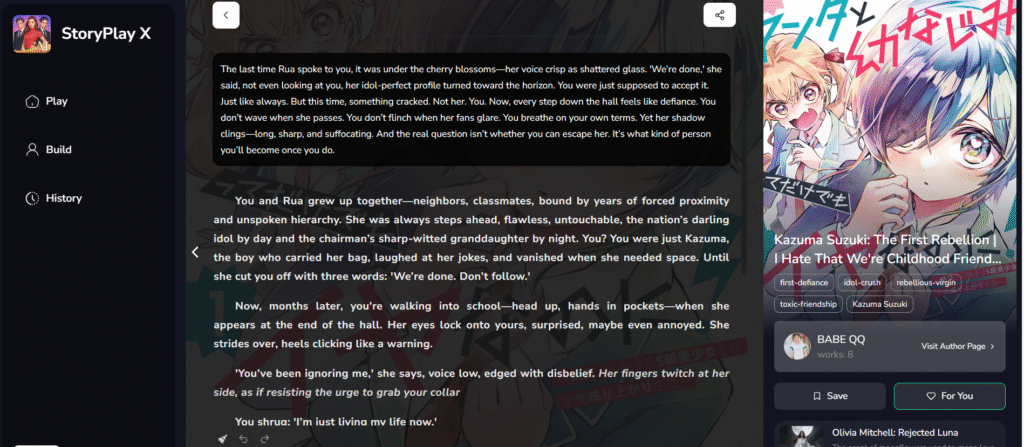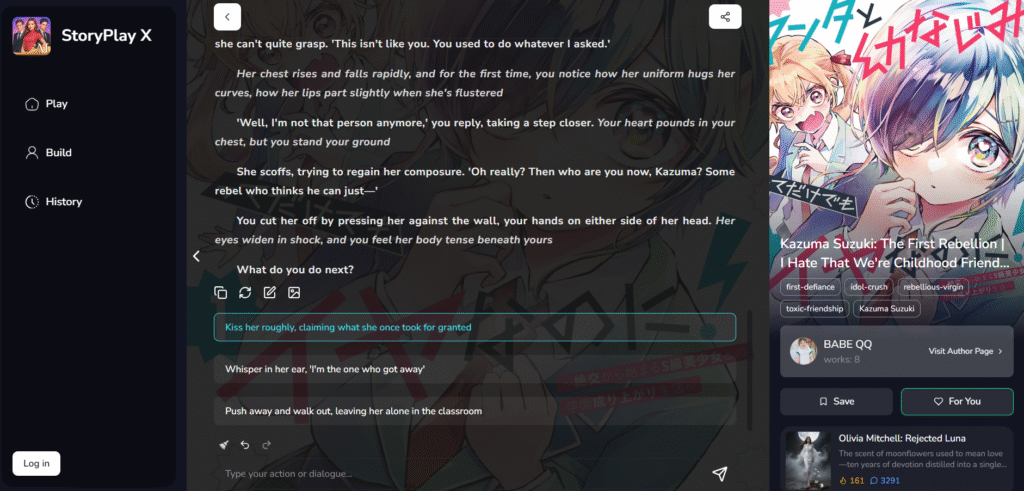Table of Contents
When your childhood friend looks at you with those perfect idol eyes and says “We’re done,” do you bow your head like you always have, or do you finally, finally fight back? I Hate That We’re Childhood Friends Novel Updates has captured millions of readers worldwide by asking this simple yet revolutionary question. This isn’t your typical childhood romance where patient devotion wins the day. This is the story of Kazuma Suzuki’s awakening—from doormat to human being—and thanks to StoryPlay X, you don’t just read about his rebellion. You live it.
The phenomenon of I Hate That We’re Childhood Friends Novel Updates speaks to something deeper than mere entertainment. It taps into the universal experience of unbalanced relationships, of giving too much and receiving too little, of being someone’s convenience rather than their choice. And when readers discovered they could actually make Kazuma’s choices themselves through interactive storytelling, the story evolved from cathartic reading to therapeutic experience.
Understanding the Revolution of I Hate That We’re Childhood Friends Novel Updates
At its core, I Hate That We’re Childhood Friends Novel Updates deconstructs the childhood friend romance trope with surgical precision. Rua isn’t just beautiful and successful—she’s the nation’s darling idol, the chairman’s granddaughter, and most importantly, someone who has systematically trained Kazuma to exist solely for her convenience. She’s perfection weaponized, charm turned into chains.
Kazuma’s transformation in I Hate That We’re Childhood Friends Novel Updates resonates because it’s painfully authentic. How many of us have been the “reliable friend” who drops everything when called? The one who laughs at jokes that hurt, who disappears when inconvenient, who mistakes being needed for being loved? When Rua dismisses him under the cherry blossoms—not even granting him the dignity of eye contact—something finally breaks. Not dramatically, not vengefully, but quietly. He simply stops playing his assigned role.
The genius of I Hate That We’re Childhood Friends Novel Updates lies in what happens next. Kazuma doesn’t transform into an alpha male revenge fantasy. He doesn’t suddenly become rich, handsome, or powerful. He just… breathes. He walks with his hands in his pockets. He doesn’t wave. He doesn’t flinch. These small acts of defiance carry more weight than any grand gesture because they’re real, achievable, and utterly terrifying to someone like Rua who has never questioned the natural order of their relationship.
Why Toxic Childhood Friend Dynamics Strike Such a Chord

Traditional childhood friend romances operate on the premise that shared history equals romantic destiny. I Hate That We’re Childhood Friends Novel Updates brutally exposes this fantasy. Shared history can also mean accumulated hurt, normalized disrespect, and patterns so ingrained that breaking them feels like betraying your very identity. The title itself—”I Hate That We’re Childhood Friends”—captures the trap perfectly. The history that should be treasure has become prison.
Readers flock to I Hate That We’re Childhood Friends Novel Updates because it validates a feeling many carry but rarely articulate: that being someone’s childhood friend doesn’t obligate you to accept whatever treatment they dish out. That loyalty has limits. That love—real love—requires respect, not just familiarity. The story’s popularity reflects a generational shift in how we understand relationships and personal boundaries.
What sets I Hate That We’re Childhood Friends Novel Updates apart from revenge fantasies is its emotional honesty. Kazuma’s rebellion costs him. He loses his social circle (they were always Rua’s friends anyway). He faces rumors and isolation. But he also discovers something revolutionary: his own preferences, his own dreams, his own worth beyond being Rua’s convenient shadow. This realistic portrayal of growth—messy, painful, but ultimately liberating—explains why readers return to the story again and again.
Experience Kazuma’s Rebellion on StoryPlay X
When you import I Hate That We’re Childhood Friends Novel Updates into StoryPlay X, the story transforms from passive consumption to active participation. That pivotal hallway scene where Rua confronts Kazuma about ignoring her becomes YOUR moment of truth. The platform’s StoryCard system remembers your choices, creating a personalized narrative that reflects your own journey toward self-respect.
Consider the three responses when Rua declares “You don’t get to walk away from me.” Choosing “Then why did you throw me away first?” leads down a path of direct confrontation in I Hate That We’re Childhood Friends Novel Updates. This route explores what happens when Kazuma stops protecting Rua from the consequences of her actions. Her shock, her scrambling to regain control, and ultimately her forced recognition of Kazuma as an equal create a satisfying arc of accountability.
The apologetic response—”I’m sorry… I just needed to breathe”—might seem weak, but in StoryPlay X‘s interpretation of I Hate That We’re Childhood Friends Novel Updates, it becomes a strategic retreat. This path reveals Kazuma’s growth through subtlety. He’s not fighting Rua directly but slowly establishing boundaries while maintaining surface civility. It’s psychological warfare disguised as submission, perfect for readers who understand that sometimes the quietest rebellions are the most effective.
The defiant “Watch me” with a cold smile catapults I Hate That We’re Childhood Friends Novel Updates into full confrontation mode. This choice triggers Rua’s complete breakdown of her worldview. StoryPlay X tracks how this affects not just the main relationship but ripples through the entire school ecosystem. Former “friends” must choose sides. Teachers notice the shift in dynamics. The idol’s perfect image begins showing cracks as her emotional support system walks away.

Five Pivotal Scenes from I Hate That We’re Childhood Friends Novel Updates Reimagined
1. The Cherry Blossom Betrayal Redux
In StoryPlay X‘s version of this scene from I Hate That We’re Childhood Friends Novel Updates, you can interrupt Rua’s dismissal. Stand up and leave first. Laugh at the absurdity. Or deliver your own prepared speech. Each choice rewrites the foundational trauma, exploring how different responses might have changed everything.
2. The Hallway Power Shift
The confrontation scene becomes a chess match. Do you maintain eye contact to establish dominance? Look past her to show indifference? Or focus on your phone, treating her like any other interruption? I Hate That We’re Childhood Friends Novel Updates on StoryPlay X shows how body language alone can flip power dynamics.
3. Student Council Showdown
When Rua uses her position to summon Kazuma, StoryPlay X offers delicious options. Ignore the summons entirely. Show up with witnesses. Or comply but bring documentation of every past incident. This scene in I Hate That We’re Childhood Friends Novel Updates becomes a lesson in institutional power versus personal agency.
4. Concert Backstage Truth
A pivotal scene where Kazuma accidentally sees Rua’s vulnerable moment backstage transforms based on your choices. Offer comfort and risk falling back into old patterns? Walk away and maintain boundaries? Or use this knowledge strategically? I Hate That We’re Childhood Friends Novel Updates explores the complexity of seeing your oppressor’s humanity.
5. Graduation Day Reckoning
The final scene of I Hate That We’re Childhood Friends Novel Updates branches into multiple endings. Accept Rua’s tearful apology? Deliver your own closure speech? Or simply walk past without acknowledgment? StoryPlay X tracks your entire journey to determine which endings feel earned versus forced.
Deep Character Psychology in I Hate That We’re Childhood Friends Novel Updates
Understanding Rua requires looking beyond her surface perfection. I Hate That We’re Childhood Friends Novel Updates gradually reveals that her control over Kazuma stems from her own insecurities. As an idol, she performs perfection for strangers. As the chairman’s granddaughter, she navigates family politics. Kazuma was her one space where she didn’t need to perform—except she forgot that he was a person, not a possession.
Kazuma’s journey in I Hate That We’re Childhood Friends Novel Updates reflects real psychological growth. His initial inability to refuse Rua stems from learned helplessness, not weakness. Years of conditioning created neural pathways where her happiness equaled his purpose. Breaking these patterns requires not just decision but consistent action, which StoryPlay X‘s choice system perfectly captures. Each small rebellion builds the foundation for larger ones.
The supporting cast in I Hate That We’re Childhood Friends Novel Updates adds layers of complexity. Some students admire Kazuma’s independence while others see betrayal of the natural order. Teachers who once ignored the dynamic suddenly notice the tension. The story brilliantly illustrates how changing one relationship affects an entire social ecosystem.
Create Your Own Rebellion Story on StoryPlay X
Inspired by I Hate That We’re Childhood Friends Novel Updates? StoryPlay X provides tools to craft your own toxic-relationship-to-liberation narrative. Start by establishing the power imbalance. What gives your “Rua” character control? Fame? Wealth? Social manipulation? Or simply the protagonist’s misplaced loyalty?
The key to replicating I Hate That We’re Childhood Friends Novel Updates‘ success lies in the small moments. Don’t jump straight to dramatic confrontations. Build through micro-rebellions: not responding to texts immediately, making plans without permission, having opinions. StoryPlay X‘s branching system excels at tracking these incremental changes and their cumulative impact.
Balance is crucial when creating stories inspired by I Hate That We’re Childhood Friends Novel Updates. The antagonist needs depth beyond mere cruelty. The protagonist’s growth must feel earned, not granted. Most importantly, the interactive choices should reflect real dilemmas faced by people in unbalanced relationships. StoryPlay X‘s analytics can help you identify which choices resonate most with readers.
Frequently Asked Questions
Is I Hate That We’re Childhood Friends Novel Updates completed?
The main storyline of I Hate That We’re Childhood Friends Novel Updates has reached its conclusion, but side stories and alternate routes continue to be released. The interactive version on StoryPlay X adds new possibilities with each update.
Can I change Rua’s personality in the interactive version?
While you can’t fundamentally alter Rua’s character, your choices in I Hate That We’re Childhood Friends Novel Updates on StoryPlay X influence how she develops. Consistent boundary-setting can lead to her growth, while enabling behaviors reinforces her toxic patterns.
Are there happy endings available?
Yes, I Hate That We’re Childhood Friends Novel Updates offers various endings ranging from complete separation to healthier reconciliation. The “happy” ending depends on your definition—some readers find Kazuma’s independence happiest, while others prefer reformed relationships.
How do I unlock hidden storylines?
Hidden routes in I Hate That We’re Childhood Friends Novel Updates on StoryPlay X often require specific choice combinations or exploring seemingly minor character interactions. The community regularly shares discovery guides for secret content.
Community Discussions and Future Developments
The I Hate That We’re Childhood Friends Novel Updates community has developed fascinating theories about Rua’s behavior. Some argue she’s equally trapped by societal expectations, performing the role of perfect idol even in private relationships. Others see her as a cautionary tale about how privilege can corrupt empathy. These discussions enrich the interactive experience, as StoryPlay X allows creators to explore different interpretations through branching narratives.
Fan creators have expanded the I Hate That We’re Childhood Friends Novel Updates universe with alternate timelines. What if Kazuma had set boundaries earlier? What if Rua had a revelation before the cherry blossom scene? These “what-if” scenarios flourish on StoryPlay X, where readers can experience dozens of variations on the core theme of reclaiming personal agency.
The influence of I Hate That We’re Childhood Friends Novel Updates extends beyond entertainment. Readers report using Kazuma’s journey as inspiration for addressing their own unbalanced relationships. The interactive element particularly helps, as making choices for Kazuma becomes practice for making similar choices in real life. StoryPlay X has become an unexpected tool for emotional growth through storytelling.
As I Hate That We’re Childhood Friends Novel Updates continues evolving, one thing remains clear: stories about breaking free from toxic dynamics will always find an audience. Because whether it’s a childhood friend, a family member, or a romantic partner, we all know someone who takes more than they give. And we all need reminders that walking away isn’t betrayal—it’s survival.
